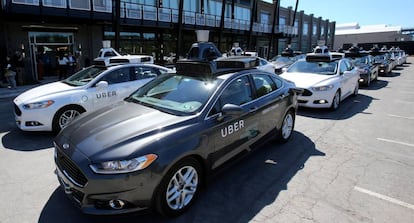“Uber is a transportation company”: European Union backs Spanish courts
Advocate General considers that 27 member states can force the company to have licenses for its activity

The European Union’s Advocate General announced on Thursday that Uber is primarily a transport company rather than an intermediary between passengers and drivers, and as such the US firm could be obliged by member states to hold the same licenses and permits to carry out its activities as existing taxi service providers.

“Taking account of the fact that the supply of transport constitutes, from an economic perspective, the main component, whilst the service of connecting passengers and drivers with one another by means of the smartphone application is a secondary component, the Advocate General proposes that the Court’s answer should be that the service offered by the Uber platform must be classified as a service in the field of transportation.
“Uber cannot be regarded as a mere intermediary between drivers and passengers. In addition, in the context of the composite service offered by the Uber platform, it is undoubtedly transport (namely the service not provided by electronic means) which is the main supply and which gives the service meaning in economic terms,” adds the Advocate General’s statement.
Uber has been given a rough ride in Spain, with taxi drivers staging mass protests to protect their livelihoods
This reasoning is shared by most rulings on Uber’s activities in the Spanish courts brought before them by taxi associations. The Advocate General’s comments are not binding, and the EU is expected to issue a final ruling before the end of the year. If it follows the Advocate General’s assessment, Uber will face serious problems implementing its business model in Europe.
The European Court of Justice will have to decide in the coming months whether Uber is a transportation company or an intermediary platform, the job of which is solely to put drivers and passengers in touch. However, such a ruling will only affect its UberPop ride service, which was the origin of a lawsuit in Barcelona and that in Europe is still only available in Zurich.
Uber has already been given a rough ride in Spain, with taxi drivers staging mass, and at times violent, protests to protect their livelihoods.
In 2014, a Spanish judge ordered Uber to cease all activities in Spain. The company had set up its UberPop operation in Madrid, Barcelona and Valencia.
The ban was imposed without hearing the arguments of Uber, given that the company is based in the US tax haven of Delaware. The judge’s writ also instructed telecommunications and electronic-payment firms to stop processing transactions for Uber in Spain, as well as no longer hosting its software and applications.
In mid-2015, Uber returned to Barcelona operating as a food delivery service known as Uber Eats.

In March 2016, it announced a comeback in the Spanish capital via UberX, which puts users in touch with professional drivers holding passenger transport vehicle (VTC) licenses, which fall under different regulations from the taxi sector.
In December of last year, Uber launched UberONE, using luxury Tesla electric cars.
Uber has always described itself as an intermediary, arguing that it has no vehicle fleet of its own and doesn’t pay the drivers it uses a salary and concluding that therefore it should not be subject to the same rules as the taxi industry.
The Advocate General disagrees with this definition, and charges that Uber is not a ride-sharing company either, as it also claims: “Uber does not offer a ride-sharing service, since the destination is selected by the passenger and the driver is paid an amount that far exceeds the mere reimbursement of costs incurred.”
Uber does not offer a ride sharing service either, says the EU Advocate General
The Advocate General’s announcement comes after a Barcelona court passed on the issue to the European Court of Justice in 2015, requesting orientation on interpreting EU law after a lawsuit was brought before it by the Barcelona-based Elite Professional Taxi Association in 2014.
The taxi drivers called for Uber to be prevented from operating in the Catalan capital on the basis of unfair competition. “If the judge accepts that it offers passenger transport, [Uber] will have to adjust to the law: possess a license and pay taxes. Otherwise, it will have to detail what it does and the magistrate will decide if it is legal,” said the association at the time it presented the lawsuit.
The European Commission has issued a number of statements in recent years suggesting it takes a different view of Uber, defending the so-called sharing economy, arguing it brings innovation. It has also noted that taxi drivers should not consider Uber an enemy.
Last year, Uber recruited former EC Commissioner for the Digital Agenda Neellie Kroes, a long-standing advocate of free competition in the taxi sector.
English version by Nick Lyne.
Tu suscripción se está usando en otro dispositivo
¿Quieres añadir otro usuario a tu suscripción?
Si continúas leyendo en este dispositivo, no se podrá leer en el otro.
FlechaTu suscripción se está usando en otro dispositivo y solo puedes acceder a EL PAÍS desde un dispositivo a la vez.
Si quieres compartir tu cuenta, cambia tu suscripción a la modalidad Premium, así podrás añadir otro usuario. Cada uno accederá con su propia cuenta de email, lo que os permitirá personalizar vuestra experiencia en EL PAÍS.
¿Tienes una suscripción de empresa? Accede aquí para contratar más cuentas.
En el caso de no saber quién está usando tu cuenta, te recomendamos cambiar tu contraseña aquí.
Si decides continuar compartiendo tu cuenta, este mensaje se mostrará en tu dispositivo y en el de la otra persona que está usando tu cuenta de forma indefinida, afectando a tu experiencia de lectura. Puedes consultar aquí los términos y condiciones de la suscripción digital.








































